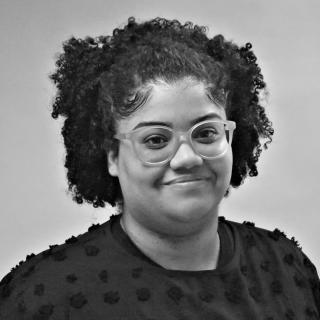
First-Gen PhD student research aims to characterize Latinx immigrants contribution to Philly’s vitality
Stephanie Rivera-Kumar's research highlights the influence the Latinx community has on Philadelphia & how this growing population is creating a positive impact.
Stephanie Rivera-Kumar is a first-generation student and daughter of Mexican immigrants. Her father is from Mexico City with roots in Oaxaca and mother from Michoacán.
Rivera-Kumar is originally from Dallas, Texas and moved to Philadelphia in August 2018 to support her partner and now spouse when he moved to Philadelphia for employment opportunities.
“I’m an extremely goal-oriented person and love challenges,” Rivera-Kumar explained. “Exceeding expectations motivates me. Too often, I’ve worked with people who expect less of Hispanic/ Latinx individuals, and I like to prove that we are more than capable of excelling.”

Rivera-Kumar was a 2021 Al DíA 40 Under 40 Honoree, which marked the second annual Al DÍA 40 Under 40 event highlighting and showcasing some of the most diverse and impactful young professionals across the Philadelphia region.
UPenn PhD student
According to ZIPPIA, 47.1% of all doctoral students are women, almost a 36% increase since 2010. Hispanic or Latino represent 16.7% of doctoral students, Asian 11.5% and Black or African American 10.5%.
As of Fall 2021, 56% class of 2025 identify as Black, Hispanic, Asian, or Native American at the University of Pennsylvania (UPenn), where Rivera- Kumar is a second-year doctoral student in City and Regional Planning at the Stuart Weitzman School of Design.
She is a non-traditional student who worked in the hospitality and real estate industries and most recently in the nonprofit and social impact sectors before pursuing a PhD.
Her academic journey was off to an auspicious start after being selected as a Fontaine Fellow at UPenn, which ensures she can pursue her PhD without incurring additional student loan debt.
Rivera-Kumar credits her undergraduate years at the University of Texas at Arlington (UTA) and being selected as a McNair Scholar with planting a seed to pursue a PhD.
“I wanted to obtain a PhD and become a professor to increase representation in academia,” Rivera- Kumar recalls at the time. “I recognized there was a need for more Hispanic professors in the classroom, especially with a growing Hispanic population in the U.S.”
The PhD program gives first and second year students opportunities to collaborate and participate in a City and Regional Planning Doctoral Seminar, “where we can learn about each other’s work and provide feedback, which helps us refine our research design,” explained Rivera-Kumar, who adds that fellow doctoral students challenge her to think beyond her assumptions and consider different perspectives. Additionally, students can collaborate with one another as mentors in the Penn Institute for Urban Research (Penn IUR) Undergraduate Urban Research Colloquium.
Rivera-Kumar actively collaborates with other students as a Research Assistant in the Center for Guaranteed Income Research at the School of Social Policy & Practice.
RELATED CONTENT
PhD research
We can accomplish great things if we can access all of the necessary resources to obtain success
In order to secure funding for her doctoral research, she applied for a competitive fellowship at the University of Pennsylvania—The Center for the Study of Ethnicity, Race, Immigration (CSERI) Turner Schulman Graduate Fellowship.
Her research Vitality: Latinx Immigrants Strengthening Philadelphia, PA, which aims to characterize how Latinx immigrants in Philadelphia contribute to the city’s vitality through their work and engagement with individuals outside their immediate communities. Particularly, immigrants’ labor trajectories and in identifying how Latinx immigrants support middle-and upper-class populations through employment consisting of services rendered.
The research was also inspired by a spectrum of circumstances, many of which are personal—her parents’ journey to the U.S. and the 2016 election.
“I witnessed the U.S. elect someone who demonized immigrants, which created palpable anxiety for millions of people,” Rivera-Kumar emphasized. “I have been observing people’s attitudes toward Latinx immigrants and realized most people don’t realize how much Latinx immigrants contribute to a city or region to increase its cultural richness and livability.”
She further adds that the research is imperative “for the Latinx community because it will highlight the influence the Latinx community has on Philadelphia and how this growing population is thriving and creating a positive impact for everyone.”
She hopes to secure a tenure-track position at a Research I (R1) institution, which are the most research-intensive institutions by the Carnegie Classification of Institutions of Higher Education. Also, mentor first-generation, low-income students who may find navigating higher education overwhelming or difficult.
“I know I could not have made it this far without amazing mentors who challenged, motivated, listened, and advised me along the way,” Rivera-Kumar assures.
Words of Wisdom
Rivera-Kumar feels that pursuing a PhD program is very similar to her experience working in the nonprofit sector for ten years because it requires self-motivation, attention to detail, the ability to meet deadlines, and a commitment to a greater goal, not only the assignment, semester or milestone, but the research and the contribution it can make to your respective field.
She recommends that prior to applying to a PhD program students have a research idea. This will help the admissions committee understand your motivation and interests for pursuing a PhD, and upon being accepted to the program allow your coursework and assignments to focus on your dissertation topic.
“I’m still refining my research question, having a general idea of my dissertation research has helped me focus my time and energy,” she explained. “As a result, I now have materials I can use for research proposals, grant applications, and conference abstracts.”
Your voice is needed. You can do it! Your entire life has prepared you for this!











LEAVE A COMMENT:
Join the discussion! Leave a comment.